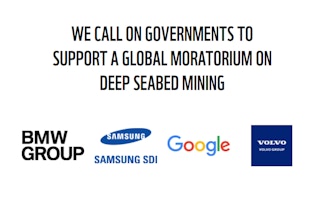Four multinational corporations that use rare metals for the electronic components in their products have called for a temporary ban on deep sea-bed mining, because of the environmental impact that mining the deep could have on poorly understood ecosystems.
To continue reading, subscribe to Eco‑Business.
There's something for everyone. We offer a range of subscription plans.
- Access our stories and receive our Insights Weekly newsletter with the free EB Member plan.
- Unlock unlimited access to our content and archive with EB Circle.
- Publish your content with EB Premium.
The call for a moratorium was led by BMW in partnership with conservation group World Wide Fund for Nature (WWF), and signed by Samsung, Google and Volvo.
The four firms said in a statement, published on Wednesday (31 March), that they will not source minerals mined from the deep sea floor, keep it out of their supply chains, and not invest in deep-sea mining activities.
A decision on whether commercial deep sea-bed mining will go ahead is expected this year, with supporters of deep-sea extraction arguing that it is necessary to power the energy transition; minerals such as cobalt, nickel, and copper are used in solar panels and batteries, and demand for them is soaring.
Pro-miners also say that deep-sea mining will create great riches with minimal environmental impact by sucking polymetallic nodules found lying on the ocean bed, and benefit the livelihoods of Pacific Island communities.
But environmentalist groups such as WWF say there are sufficient resources on land, and warn that mining the sea floor could destroy entire habitats, create pollution in areas that have been undisturbed for millennia, and affect the ocean’s oxygen-providing capacity.
The four firms said that before any deep sea-bed mining occurs, it needs to be clearly demonstrated that sea-floor excavation can be done in a way that effectively protects the marine environment.
“All alternatives to deep sea minerals must be explored as a matter of urgency, with a focus on reducing demand for primary metals, transitioning to a resource-efficient, closed-loop materials economy, and developing responsible terrestrial mining practices,” they said.
John Tanzer, global ocean leader, WWF International, called on other companies “who care about the ocean” to sign the statement.








